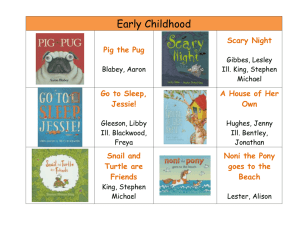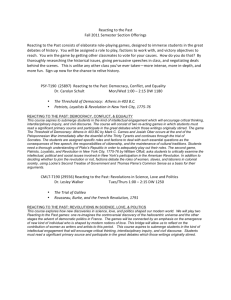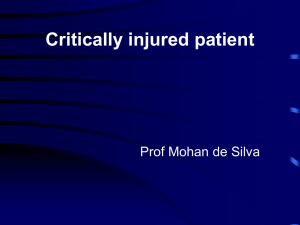Special Psychiatric Rapid Intervention Team (S.P.R.I.N.T.)
advertisement
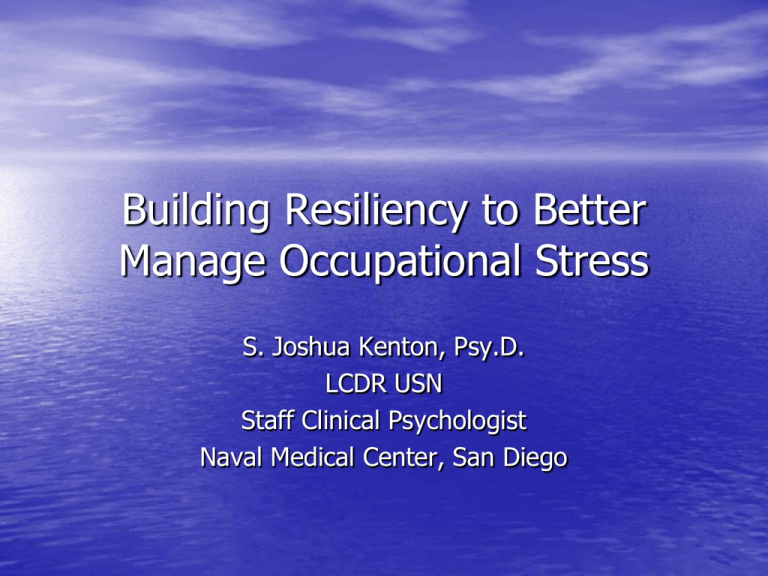
Building Resiliency to Better Manage Occupational Stress S. Joshua Kenton, Psy.D. LCDR USN Staff Clinical Psychologist Naval Medical Center, San Diego Work Related Stress • Unreasonable demands for performance • Lack of interpersonal communication between the employer and the employees • Lack of interpersonal relationship among the employees • The fear of losing one's job/job insecurity • Long working hours • Less time to spend with the family • Under utilization of skills Psychological Symptoms • Mood swings • Anxiety • Depression • Irritability • Poor decision making • Lack of concentration Physical Symptoms • Suppression of immunity resulting in infection • Headaches • Increased appetite leading to weight gain. • Sleeplessness • Loss of sexual drive • Memory disturbances Behaviors you may display… • • • • • • Change in friends Withdrawal Changes in appetite Inability to rest Pacing Change in sexual functioning • Increased Alcohol • • • consumption Emotional outbursts Erratic movements Change in speech patterns Stress Injury Sources: Intense or Prolonged Stress Impact A trauma injury Due to events provoking terror, helplessness, horror, shock Wear & Tear LOSS INNER CONFLICT A beliefs injury A grief injury A fatigue injury Due to loss by Due to conflict Due to the between death or accumulation moral/ethical of stress over separation of beliefs and time people who are current cared about experiences Stress Injury Sources: Common Examples in Healthcare Setting Impact ER Trauma Care Psychiatric Emergencies Response ICU, NICU, etc Wear & Tear LOSS INNER CONFLICT Loss by death of Facing decision Long shifts about balancing critical care pts. Frequent Pt. care with Deployments suicide, etc. Self-Care Staffing Loss of job/role, Feeling shortages, and relationships, changes; PCS disillusioned etc. HEALTHY READY “Fit & Focused” Well-trained and qualified Positive command climate High morale Strong cohesion Good order and discipline Clear sense of mission Exhibits ethical and moral behavior Balanced & healthy relationships READY REACTING INJURED GREEN ZONE ILL RECOGNIZING STRESS REACTION REACTING Anxious, irritable, sad Poor concentration Trouble sleeping, fatigued Changes in appetite Apathy, loss of interest Negative, pessimistic Increased interpersonal conflict Poor decision-making READY REACTING INJURED ILL RECOGNIZING STRESS INJURY INJURED Poor emotional control Major sleep difficulties Guilt, shame, fear Loss of interest Disruption of moral values Substance Abuse Decreased confidence Poor morale Family disruption READY REACTING INJURED ILL RECOGNIZING STRESS ILLNESS READY REACTING ILL • Chronic and severe distress • Substance dependence • Major disruptions of sleep, appetite, mood • Significant problems at work • Panic, rage, guilt, and shame • Symptoms that persist or get worse over time • Injuries that don’t heal without help • Family/relationship violence or abuse INJURED ILL What Doesn’t Help • Using alcohol or drugs • Violence or conflict • Overeating/restricting diet • Working too much • Blaming others • Withdrawing from pleasant activities Building, Maintaining and Restoring Your Resiliency • • • • • • • • Create small goals Stay in the here and now Don’t run from the problem/Keep things in perspective Maintain an outlook of hope More fun Rely on good relationships Exercise Breathing/Relaxation Conclusion • Managing stress takes practice • Be preventative • Stay in the Green/Yellow • Look out for each other • Know when to get professional help.
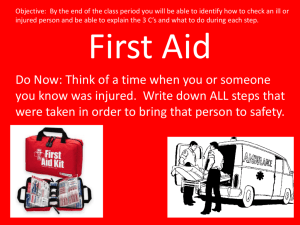
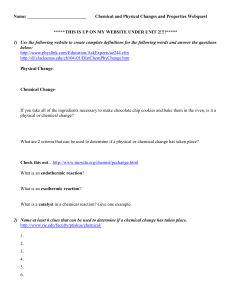
![School Health Assistant [Spec]](http://s3.studylib.net/store/data/006873833_1-1bc5937d85c8807b7503136973f9f3ce-300x300.png)

